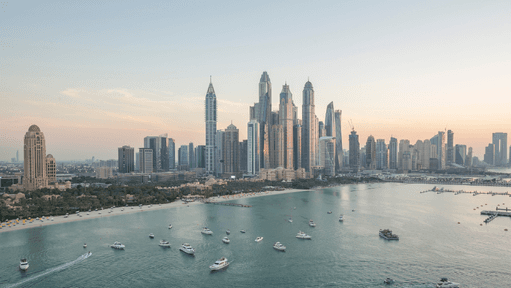
GCC REITs Set for Growth Amid Favorable Economic Conditions
Lower Interest Rates and Tax Exemptions Create Promising Landscape for Real Estate Investment Trusts in the UAE and Saudi Arabia
Real estate investment trusts (REITs) are poised for growth in the GCC region, driven by lower interest rates and tax exemptions, alongside government efforts to diversify investment opportunities. The spotlight on REITs in the UAE intensified recently as Dubai Holding, a state-backed conglomerate, considered launching a REIT, and Dubai developer BinGhatti explored similar plans after issuing a $200 million bond earlier this year.
An analyst from Zawya noted that Saudi Arabian developers could also benefit from REITs as an alternative source of financing. Emirates REIT, the region’s oldest, made headlines with the sale of a $196 million office asset in Dubai Internet City, part of its portfolio valued at $990 million as of August. The sale proceeds will be used to partially redeem sukuk certificates issued in 2022, following an earlier refinancing effort rejected by bondholders.
Despite challenges like Emirates REIT’s sukuk struggles, the recent 50 basis point interest rate cut by the U.S. Federal Reserve is expected to boost momentum for both existing and new REITs. This structure's tax-efficient nature is becoming more attractive, particularly with the introduction of a 9% corporate tax in the UAE. Samir Kazi, head of real estate at ENBD Asset Management, emphasized the positive impact of this tax landscape on the REIT sector, adding that ENBD REIT is seeking a tax exemption from the Federal Tax Authority.
The UAE’s office market, which has maintained high occupancy rates despite global trends toward remote work, has become a prime target for REITs. In addition, multi-family build-to-rent developments and data centers, driven by investments in AI, are also attracting interest.
However, challenges remain. REITs need long-term, profit-only finance for Shariah-compliant trusts or interest-only conventional debt, ideally lasting five to ten years, according to Mohamed Ali, managing director of Atheel Partners. He stressed the importance of strategic asset acquisition, rather than simply capitalizing on cheaper financing, and warned against complacency when it comes to capital expenditure and tenant retention.
REIT performance is often measured by net asset value (NAV) per share, and many GCC REITs are currently trading at significant discounts. Emirates REIT, which focuses on commercial and educational properties, reported an NAV per share of $1.76 for the first half of 2024, yet its share price stands at just $0.23. Similarly, ENBD REIT reported an NAV of $0.80, with shares trading at $0.34. However, Al Mal Capital REIT, which specializes in educational assets, recently saw its share price exceed its NAV per share of AED 1.11.
In Saudi Arabia, Riyad REIT reported an NAV per share of SAR 11.01 ($2.94), but its shares are trading at a significant discount at SAR 6.75. Meanwhile, Jadwa REIT has a narrower gap, with an NAV of SAR 11.22 and a share price of SAR 10.90.
Despite these challenges, Ali expressed optimism, citing the potential for tax exemptions to further encourage REIT activity and attract foreign direct investment (FDI) into the commercial real estate sector. He believes that current conditions present an opportunity for players to strengthen their portfolios, driven by confidence in the region’s economic resilience.
For any enquiries or information, contact ask@tlr.ae or call us on +971 52 644 3004. Follow The Law Reporters on WhatsApp Channels